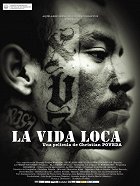Ohjaus:
Christian PovedaKäsikirjoitus:
Christian PovedaKuvaus:
Christian PovedaSävellys:
Sebastian RoccaJuonikuvaukset(1)
In Central America they are referred to as the maras: modeling themselves on Los Angeles youth gangs, these groups are now spreading terror in El Salvador and further afield. The film takes us deep into the heart of San Salvador's suburbs and into the everyday life of the members of an invisible army. A new global curse that destroys democratic principles through indiscriminate violence and condemns to death youth deprived of any hope for the future. (Moscow International Film Festival)
(lisää)Arvostelut (2)
Suggestive, raw, directly made to fit and without attempting to evaluate the situation in any way. It evaluates itself best. And an excellent musical component. It’s no wonder that the creator paid with blood – the degree of closeness to Mary's life is deadly. Highly recommended particularly to those who have at least a basic knowledge. Highly recommended to combine with Fukunaga's Sin Nombre.
()
To fully understand the situation presented to viewers by La Vida Loca, it is necessary to know at least the basic facts about the recent history and present of El Salvador. 20 years ago, a 13-year-long civil war between an extreme right-wing military dictatorship and left-wing guerrillas, fought with exceptional resilience and cruelty by both sides, came to an end. Naturally, the civilian population suffered the most in this conflict. The mass emigration to the United States, which is so typical for Latin America due to economic reasons, was supported by a massive exodus to escape death squads, bombings, and general violence. In the United States, Latin Americans traditionally had a heavily subordinate status, and in order to compete with cheap labor, they began to form similar associations following the example of local gangs. When the need for the US authorities to at least outwardly tolerate refugees disappeared after the signing of the peace agreement and the fall of the dictatorship, their deportation back to El Salvador followed. There, the prospects for a better life were grim, but there were plenty of weapons and the authorities, including the police, were much worse off than in the United States. The gangs became even more brutal, and in a short period of time, El Salvador became a country that persistently competes for first place in the number of murders per capita. I would like to remind you that considering the population size, especially with the figure of 12 deaths per day in gang-related clashes, this ultimately amounts to a much larger number of victims than in many wars of lower intensity that regularly fill the space in the media and provoke passionate reactions. This documentary is very powerful, raw, and chilling. Additionally, it is clear that during filming, it was quite dangerous, as confirmed by the director's death in the end. The entire documentary is underscored by a musical soundtrack of gangster rap. A very strong experience. Overall impression: 95%. Poveda practically did not need any commentary; the camera capturing everything was more than enough.
()
Kuvagalleria (13)
Kuva © Ascot Elite Filmverleih


Mainos